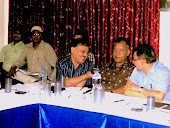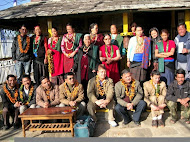Shock Therapy to Reform Bureaucracy
(Published in Good Governance in Nepal March-April 2004)
-By Bhim Upadhyaya
Bureaucracy is the institutionalized administrative arrangement to execute works in ways and manners that are consistent with laws and rules. Bureaucracy is often criticized in the absence of the methodology and dynamism that accepts rules, laws and procedures as the basis. German sociologist Max Weber, the father of bureaucracy, in the 19th century, propounded the principle of structures of bureaucracy, its outlines and features. Government in any country forms the biggest organization. It seems impossible to run such a huge organization without the effective appropriate organizational management. Because of such qualities as specialization, expertise, division of works, standardization, the rule of law, uniformity in order and clear responsibility, accountability, political neutrality, impersonality, etc, the bureaucracy has its own importance. Now let's examine the present day bureaucracy, known as permanent government, in light of such characteristics prevalent in the 19th century.
The prime minister, ministers and the chief secretary entrusted with the responsibility of steering the country ahead are often heard of making complaints against inaction of the bureaucracy. It must be declared who were responsible for the past wrong actions and what actions were taken against them. Surprisingly, the prime minister, a few weeks ago, warned that the secretary and the project chief would be subjected too action in case they failed to execute their works satisfactorily. By extension, this means no one was thus far responsible for a particular work. The communication minister of a country that is well into the 21st century said a few weeks ago out of frustration, "Since the government ministers and secretaries could not make use of computers and make most of the information technology, the nation is lagging behind. We must provide them training." The chief secretary himself had to admit that employees regard themselves not as server of the people but as ruler. How did our country with more than five decades' political and administrative experience come to such a pretty pass? If those who are in responsible positions, confine themselves to mere analysis and interpretation, who will implement? They must understand that they are implementer, ad not researcher or analyst. How can it be justified if the persons in decision=making positions do not shoulder their responsibility and become hypercritical only? If so, what's the meaning of being responsible? If the people with long-standing experience in both the Panchayat and democratic regimes show such a dismal performance, what can we expect from others? They belong to the category of those who know how to make wrongs, but don't know how to right them. To except that development ad construction are in a sorry state and to thing that one's duty is finished once the directives are issued to achieve the set targets in the coming days in a situation which we should feel ashamed of.
Those who are indulged in mere problem analysis, and pas the buck when it comes to implementation are an unnecessary burden. What's the contribution of the so-called experienced bureaucracy of Nepal except creating a mess? Famous sociologist Dor Bahadur Bista has characterized Nepal's bureaucracy as A B C meaning Aafno manchhe or your own men, Bhansun or source-force and Chakari-chaplusi or sycophancy. The degree of such characteristics in the bureaucracy has not decreased- rather it has thickened. This is the legacy of the bureaucracy we have acquired from our predecessors. Accept it or not, it is our predecessors who are responsible for today's mess. No state machinery in proper shape and order. In such situation when the existing mechanism is in disarray, if someone comes with high promised that he will correct the situation, nobody will believe him. If the existing problems remain for from resolved, the solution of emerging problems borders on impossibility. Instead of achieving specialization and expertise, intervention from outside is also o the rise. The rule of law is getting diluted.
Criticizing the scholars, Karl Marx had said scholars have so far only attempted to interpret the world, but what actually matter is to change it. Such intellectuals who only make noised for reforms in the bureaucracy hold no waters at all. Thrashing out means and measures to change bureaucracy is the main agenda at present. Those who messed up governance are now blowing trumpets of good governance. We cannot rest faith in immoral officials to bring about changes in governance by reforming themselves. The present state of bureaucracy has a domination of he people with characteristics as described by Dor Bahadur. Sycophancy, corruption, centralism, unaccountability, inability, inefficiency, immorality, will-powerlessness, de-motivation, lack of transparency, lack of people's participation, studiouslessness, lack of culture, are the main characters and maladies of Nepalese bureaucracy. So the simple methods will not cure such big maladies for good. What require are the prompt and speedy curative measures. I f delayed to get hold of sordid realities; the nation will not be absolved of these tormenting evils.
Encouraging the youths, Indian President APJ Abdul Kalaam says, to aim small is a crime. Expecting reforms from mischief-mongering bureaucrats with no vision can be likened to reversing the course of river flowing downwards. What sounds true is the aimless work doesn't yield any fruits. Saying that the real problem of Neaplese burecracy lies in its over-staffig is creating the illusion. Almost all-existing administration reform commission reports have also raised the issue of slashing the employee workforce. Though the concept of golden handshake has been brought with a bang, it has failed to gather momentum due to lack of resources and strong will power. Speaking frankly, it is not because of the over-staffing but because of some irresponsible and immoral officials who get glued to the post and are like date-expired medicines to be thrown out. Instead of evincing them with force, the attempts to bit farewell to such officials through golden handshake is like misusing the nation's assets International studies have already shown that only qualified and skilful people accept the offer of golden handshake who even can go to other institutions and work efficiently and unquestionably. Such skilled workforce is the backbone of any organization. And, only the unskilled, useless and inefficient officials remain in the organization like chaff filtered through a sieve. Officials with low-calibre never want to quit the job but incessantly conspire to lengthen official tenure. Our country's aimless bureaucrats, for example, can be taken as a case in point. The need of the hour is to sack such unskilled workforce from civil service and replace it with visionary hard working youths. Toward this end, our entire administration reform policies and strategies have to be directed. The present structure of our bureaucracy teems with unskilled manpower and wears the looks of disfigured appearance.







No comments:
Post a Comment